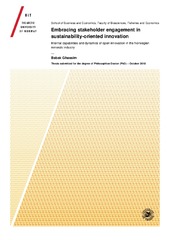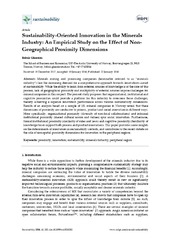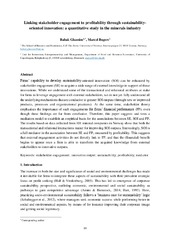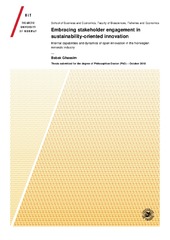| dc.description.abstract | The transition towards a sustainable minerals industry will rely on pursuing sustainability-oriented innovation (SOI), requiring continuous innovations in extraction and production processes, product offerings and the way the industry deals with its social responsibilities. Considering the breadth of SOI, mineral firms have no choice but to engage with and seek knowledge from multiple key external stakeholders. However, this stakeholder multiplicity poses significant challenges to firms, bearing in mind the diverse knowledge backgrounds and interests of these stakeholders, as well as the internal capabilities required to integrate and apply the externally acquired knowledge. Despite the growing scholarly interest in studying stakeholder engagement in SOI processes, a considerable amount of knowledge in this research field is restricted to specific types of SOI that ignore the comprehensiveness of sustainability. Therefore, the overall aim of this thesis is to answer the following question: “Under which conditions and to what extent can engaging external stakeholders improve a firm’s SOI outputs and financial performance?”. This research question is explored through four sub-research questions in three empirical papers that draw on different theoretical perspectives and methodological approaches. The first and second papers provide insights into the conditions in which stakeholder engagement can be beneficial for SOI, focusing on internal and inter-organizational factors respectively. The third paper then positions SOI itself as a mediating condition that can assist firms to reap the financial benefits from stakeholder engagement practices. As far as the extent of the effect of stakeholder engagement is concerned, the second and third papers establish an empirical link between stakeholder engagement and SOI outputs. Overall, the thesis contributes to the literature and practice by uncovering the “what”, “how”, “why” and “when” of the phenomenon of stakeholder engagement in SOI. | en_US |
| dc.description.popularabstract | This thesis is motivated by the need to ensure corporate sustainability in the minerals industry, which entails simultaneous improvements in economic, environmental and social performance. The transition towards a sustainable minerals industry will rely on pursuing sustainability-oriented innovation (SOI), requiring continuous innovations in extraction and production processes, product offerings and the way the industry deals with its social responsibilities. Considering the breadth of SOI, mineral firms have no choice but to engage with and seek knowledge from multiple key external stakeholders, including value chain partners, universities, not-for-profit organizations and local communities. However, this stakeholder multiplicity poses significant challenges to firms, bearing in mind the diverse knowledge backgrounds and interests of these stakeholders, as well as the internal capabilities required to integrate and apply the externally acquired knowledge.
Despite the growing scholarly interest in studying stakeholder engagement in SOI processes, a considerable amount of knowledge in this research field is restricted to specific types of SOI, for instance eco-innovations, which ignore the comprehensiveness of sustainability, considering its three pillars of economic, environmental and social issues. This, in turn, limits our understanding of the wider range of internal capabilities and inter-organizational factors that might affect firms’ innovative outputs. Moreover, previous research has surprisingly overlooked the importance of providing evidence regarding a business rationale for sustainability. Therefore, the overall aim of this thesis is to answer the following question:
“Under which conditions and to what extent can engaging external stakeholders improve a firm’s SOI outputs and financial performance?”
This research question is explored through four sub-research questions in three empirical papers that draw on different theoretical perspectives and methodological approaches. The first and second papers provide insights into the conditions in which stakeholder engagement can be beneficial for SOI, focusing on internal and inter-organizational factors respectively. The third paper then positions SOI itself as a mediating condition that can assist firms to reap the financial benefits from stakeholder engagement practices. As far as the extent of the effect of stakeholder engagement is concerned, the second and third papers establish an empirical link between stakeholder engagement and SOI outputs.
More specifically, paper 1 draws on the theory of absorptive capacity to explore the underlying skills and routines that form a firm’s capabilities in the recognition, assimilation and exploitation of external stakeholders’ knowledge. In terms of recognition, firms need to first keep abreast of technological and market changes that emanate from sustainability objectives, and second to increase their awareness of social issues. Accordingly, assimilation depends on the established routines for facilitating the dissemination of knowledge internally, whereas the exploitation capability rests on maintaining external relationships and piloting new solutions.
Paper 2 argues that besides stakeholder multiplicity, localization in peripheral regions adds to the complexity of SOI caused by the dearth of local knowledge spillovers and difficulty in accessing highly uncodified knowledge from a distance. The paper then builds on the concept of non-geographical proximity dimensions and proposes that a firm’s success in SOI can be explained by means of its organizational, cognitive and institutional proximity to external stakeholders. The analysis, based on survey data from 101 mineral companies in Norway, reveals that these dimensions of proximity are positively related to various types of SOI, i.e. process, product and social innovations, although in different ways. Organizational proximity and informal institutional proximity spur social innovation, while formal institutional proximity and cognitive proximity are conducive to process and product innovations.
Finally, paper 3 explains the extent to which stakeholder engagement affects SOI outputs, and whether these condition the impact of stakeholder engagement on financial performance. To this end, the paper draws on stakeholder theory and distinguishes between two main types of stakeholder engagement, namely transactional and relational interactions. By using the data from the same survey as in paper 2, it finds that both increasing the frequency of transactional engagement and the diversity of stakeholders in relational engagement are positively associated with augmented SOI outputs. Subsequently, in light of the natural resource-based view of the firm, the paper develops a mediation model, implying that SOI acts as a capability through which firms continuously respond to sustainability challenges (by means of engaging external stakeholders), thereby improving their competitiveness and profitability. The empirical analysis combines the previous survey data with firms’ accounting data, and finds that SOI fully mediates the association between stakeholder engagement and financial performance.
Overall, the thesis contributes to the literature and practice by uncovering the “what”, “how”, “why” and “when” of the phenomenon of stakeholder engagement in SOI. First, it identifies what internal, inter-organizational and external factors should be considered to explain SOI, and thereby portrays a more complete picture of SOI and its unique characteristics. Second, the study offers a pure measure of SOI to provide empirical evidence for the associations between the aforementioned factors and various types of SOI outputs. Hence, the thesis extends the literature on open innovation by introducing and testing the effect of a wider range of external stakeholders on innovative outputs. Third, the findings suggest that in order to address the fragmented and inconsistent findings in the literature, the insights from absorptive capacity, stakeholder theory and natural resource-based theory prove to be useful for theorizing the associations between engagement practices, SOI outputs and financial performance. Fourth, the thesis shows that although engaging external stakeholders can potentially lead to superior SOI outputs, internal capabilities and proximity to external stakeholders are among the key considerations that should come into play so that de facto effects appear. Finally, the work contributes to the growing debate on how corporate sustainability generates a win-win situation (for a firm and its external stakeholders) by showing that SOI lays the basis for pursuing profit-maximizing objectives, while fulfilling social and environmental responsibilities. | en_US |


 English
English norsk
norsk



